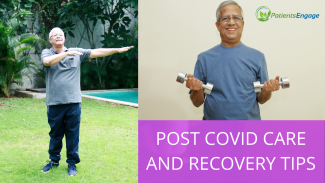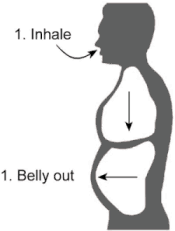
Even when the Covid infection period is over, it can take time to regain your strength and feel strong and well. Here are some useful tips by Dr. Shital Raval Patel to ensure a full recovery.
Post Covid care refers to the care that a patient may require after the period of infection. Most patients will recovery within their 14 day isolation period from the infection.
Increasingly, there are cases of post-Covid health conditions which are termed Long-Covid or Long-haul Covid wherein a person may continue to experience symptoms 4-12 weeks after recovery or even longer in some cases. The coronavirus has the potential to involve other organs besides the lungs and stay in the body for a long time in some patients.
हिंदी में पढ़े : कोविड से ठीक होने के बाद देखभाल: कुछ उपयोगी टिप्स
Complications can arise in the patient even after hospital discharge or discontinuation of home isolation. If you have signs or symptoms of any of these complications, consult your doctor immediately. People with a mild infection or even if they have been asymptomatic initially, may experience fatigue, tiredness, lethargy and lack of strength for weeks. Post Covid Care is essential and should not be ignored.
Follow these simple tips to ensure a full recovery:
- Follow-up with your doctor (physically or telephonically) for 7 days after isolation or discharge.
- Continue to take your multi-vitamins and supplements to combat lethargy and weakness.
- If you have low-grade fever, take prescribed paracetamol and keep your doctor informed. Fever is not known to last beyond the 14 days of Covid period, typically. If it does continue, please continue to be in touch with the doctor.
- If you have sore throat or congestion, continue steam inhalations (twice a day), warm saline or salt water gargles and nasal irrigations along with any prescribed medicines.
- Continue to monitor your blood oxygen levels as they may drop even after the 14 day period. The pulse oximeter is a great tool to measure the oxygen saturation at home.
- Patients with hypertension should measure their blood pressure twice a day with an electronic BP machine at home. Some patients may note that their BP has dropped and should notify their doctor regarding change/reduction in medication.
- Patients with diabetes should closely monitor their blood glucose levels especially if they have prescribed steroids. Patients with diabetes should have a Glucometer at home for monitoring.
- Patients with co-morbidities should keep their doctors informed and may need to take tests to check on their organ systems.
- Don’t rush to resume full-time work or household chores. Give your body time to heal. Return to regular activities slowly.
- Rest
- Sleep for minimum of 8 hours a day.
- Take short naps during the day when you feel tired.
- Take frequent intervals to rest during the day, to avoid exhaustion.
- Nutrition
- Eat healthy home-cooked meals. Avoid outside foods.
- If you find it difficult to eat whole meals, have small meals every 2-3 hours.
- Choose soft foods initially for easy eating and digestion such as soups, rice, yogurt, khichidi, scrambled eggs, stews etc.
- Focus on foods high on protein such as cheese (paneer), beans, pulses, lentils, eggs, lean meats, tofu, nuts etc.
- Include vitamin rich foods to regain energy and help build the immune system. Vitamin rich foods are colourful foods that we see such as fruits and vegetables. Try to cut and eat fruits instead of juicing them to retain their fiber content. Fiber will further aid in digestion and easy passage of bowel movements.
- Hydration
- Drink plenty of fluids to avoid dehydration.
- Sip on water through the day. Keep a water bottle within reach at all times.
- Besides water, opt for beverages like buttermilk, milk, tea/coffee, fresh squeezed fruit or vegetable juices and lemonade.
- Avoid carton juices, sodas and other sugary beverages.
- If your urine is yellow, it means you are not drinking enough water. Please note, vitamin supplements can also cause the urine colour to change.
- Exercise
- Start some form of exercise. Take it slow and try to increase your exercise gradually over the next few months.
- Start with doing chair exercises the 1st week and then move on to standing exercises.
- Start with low-intensity exercises like walking for 15 minutes for a week and then increase to 30 minutes the following week.
- Avoid weight training till you feel completely fit.
- Practice breathing exercises daily. This will help strength the muscles involved in respiration. Start with deep breathing for 2 minutes daily. This can be repeated twice a day. Deep breathing entails sitting with a straight back on the bed or chair, inhaling deeply with mouth closed and then exhaling all the way from the nose. (see inserted fig)

- Avoid physical exhausting activities such as travel, carrying heavy luggage, social gatherings, moving house etc.
- Get your Covid vaccine, if you haven’t already completed both doses. Wait for a minimum of 3 months or more (as advised by latest govt guidelines) post complete recovery.
- Focus on mental well-being.
- Try relaxation techniques such as yoga, meditation, mindfulness etc.
- Spend time with family.
- Catch up with friends and family members via video or phone calls.
- Engage in activities that are destressing such playing with kids, and pets. Indoor games are a great idea.
- Pick up hobbies like gardening, colouring, painting, cooking, baking, crafting etc. Brain games are ideal to keep the brain engaged such as word games, scrabble, crossword, sudoku etc.
- Speak to a mental health counsellor for more assistance with your stress, depression, anxiety or other mental health concerns.
- If you have a history of mental health illness, speak to your Psychiatrist.
- No Tobacco
- Since the coronavirus primarily attacks the respiratory system, avoid smoking and vaping to avoid any further damage to your lungs and slow down the healing process.
- Consumption of any kind of smokeless tobacco like pan masala, gutka, tobacco pan, chewing tobacco should be avoided.
- Now may be a good time to think about quitting. Speak to a Cessation counsellor on steps you can take to quit.
- Avoid alcohol
- Alcohol is known to weaken the immune system and impair the body’s ability to fight an infection.
- Never mix alcohol with medications as it can affect the potency of the drug.
- Even if you have had mild or asymptomatic infection, continue to watch out for symptoms like breathlessness, chest pain or flushes.
Patient testimonials on how they managed their post Covid Care:
Ansh (teenage student)
I tested positive with Covid around late April. Slowly building my energy, it’s better now. Step by step, increasing the amount of exercise I do and what I do. For example, cycling on flat surface is easier than cycling up a slope so for the first 3 days, I avoided the slopes. Then slowly, I was able to get back on them. I feel like this is stage 2 of my recovery.
Delna (Care-provider for family of 7)
Post 25 days of my Covid and I still feel weak. Eating right, multi-vitamins, steaming (twice daily) and adequate rest (7-8 hours of sleep) allows me to just about do my routine work in the house. Diet currently is healthy fresh veggies, fruit, and protein. If possible, try to get out for some fresh air with a double mask.
Mayank (a 2nd time Covid survivor)
My covid started on 1st of May, 2021. Still feeling weak. Am trying to eat healthy, sleep well and do yoga and pranayama to gain strength. Planning to start on high intensity interval training which I used to do earlier from next week onwards.
Drona (Veterinarian)
When I was tested positive for Covid, there was tremendous weakness and lethargy with high fever. By the end of my quarantine, I was feeling better and getting back all my strength. It’s been over a month post Covid and I am almost back to my normal routine. To gain immunity, I am taking regular medications which were advised i.e. Vitamin B complex, Vitamin C, Zinc substitutes, Vitamin D3, Tulsi and Giloy and most important daily breathing exercises. The key is to be positive and mentally strong.






